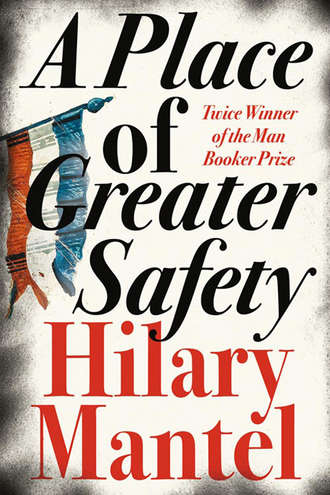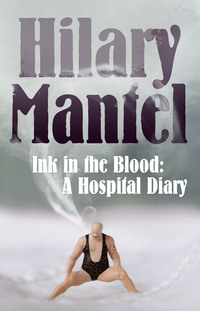
Полная версия
A Place of Greater Safety
[5.00 a.m. The leonine brow clears.]
MIRABEAU: My thanks, my thanks to you all. How can I ever thank you enough? The combination, my dear Duroveray, of your erudition, my dear Dumont, of your – snores – of all your singular talents, welded together by my own genius as an orator –
[Teutch sticks his head around the door.]
TEUTCH: Finished, have you? He’s still here, you know.
MIRABEAU: Our great work is concluded. Bring him in, bring him in.
[Dawn is breaking behind the head of the deputy from Arras as he steps into the stuffy little room. The tobacco smoke stings his eyes. He feels at a disadvantage, because his clothes are creased and his gloves are soiled; he should have gone home to change. Mirabeau, in greater disarray, examines him – young, anaemic, tired. De Robespierre has to concentrate to smile, holding out a small hand with bitten nails. Bypassing the hand, Mirabeau touches him lightly on the shoulder.]
MIRABEAU: My dear M. Robispère, take a seat. Oh – is there one?
DE ROBESPIERRE: That’s all right, I’ve been sitting for quite a time.
MIRABEAU: Yes, I’m sorry about that. The pressure of business …
DE ROBESPIERRE: That’s all right.
MIRABEAU: I’m sorry. I try to be available to any deputy who wants me.
DE ROBESPIERRE: I really won’t keep you long.
[Stop apologising, Mirabeau says to himself. He doesn’t mind; he’s just said he doesn’t mind.]
MIRABEAU: Is there anything in particular, M. de Robertspierre?
[The deputy takes some folded papers from his pocket. He hands them to Mirabeau.]
DE ROBESPIERRE: This is the text of a speech I hope to make tomorrow. I wondered if you’d look at it, give me your comments? Though it’s rather long, I know, and you probably want to go to bed …?
MIRABEAU: Of course I’ll look at it. It’s really no trouble. The subject of your speech, M. de Robespère?
DE ROBESPIERRE: My speech invites the Clergy to join the Third Estate.
[Mirabeau wheels round. His fist closes on the papers. Duroveray puts his head in his hands and groans unobtrusively. But when the Comte turns again to face de Robespierre, his features are composed and his voice is like satin.]
MIRABEAU: M. de Robinpère, I must congratulate you. You have fixed on the very point which should occupy us tomorrow. We must ensure the success of this proposal, must we not?
DE ROBESPIERRE: Certainly.
MIRABEAU: But does it occur to you that other members of our assembly might have fixed on the same point?
DE ROBESPIERRE: Well, yes, it would be odd if no one had. That’s why I came to see you, I imagined you knew the plans, we don’t want a stream of people all getting up and saying the same thing.
MIRABEAU: It may reassure you to know that I have myself been drafting a little speech which touches on the topic. [Mirabeau speaks; he also reads.] May I suggest that the question might be better propounded by some person well-known to our fellow-deputies, some orator of experience? The Clergy may be less inclined to listen to someone who has yet – what shall we say? – who has yet to reveal his remarkable talents.
DE ROBESPIERRE: Reveal? We’re not conjurers, Monsieur. We’re not here to pull rabbits out of hats.
MIRABEAU: Don’t be too sure.
DE ROBESPIERRE: Always supposing that one had remarkable talents, could there be a better time to reveal them?
MIRABEAU: I understand your viewpoint, but I suggest on this occasion you give way, for the common good. You see, I can be sure of carrying my audience with me. Sometimes when a famous name allies himself with a cause –
[Mirabeau stops abruptly. He can see on the young man’s delicate triangular face the pale traces of contempt. Yet his voice is still deferential.]
DE ROBESPIERRE: My speech is quite a good speech, it makes all the relevant points.
MIRABEAU: Yes, but it is the speaker – I tell you frankly, M. de Robertpère, that I have spent the whole night working on my speech, and I intend to deliver it, and in all possible cordiality and friendship I must ask you to find another occasion for your debut, or else to confine yourself to a few words in my support.
DE ROBESPIERRE: No, I’m not prepared to do that.
MIRABEAU: Oh, you aren’t prepared? [He sees with pleasure that the deputy flinches when he raises his voice.] It is I who carry weight at our meetings. You are unknown. They will not even suspend their private conversations to listen to you. Look at this speech, it is prolix, it is overblown, you will be howled down.
DE ROBESPIERRE: There’s no point trying to frighten me. [Not a boast. Mirabeau scrutinizes him. Experience has taught him he can frighten most people.] Look, I’m not trying to stop you making your speech. If you must, you make yours, then I’ll make mine.
MIRABEAU: But God damn you, man, they say exactly the same thing.
DE ROBESPIERRE: I know – but I thought that since you have a name as a demagogue, they might not quite trust you.
MIRABEAU: Demagogue?
DE ROBESPIERRE: Politician.
MIRABEAU: And what are you?
DE ROBESPIERRE: Just an ordinary person.
[The Comte’s face purples, and he runs a hand through his hair, making it stand up like a bush.]
MIRABEAU: You will make yourself a laughing-stock.
DE ROBESPIERRE: Let me worry about that.
MIRABEAU: You’re used to it, I suppose.
[He turns his back. Through the mirror, Duroveray wavers into life.]
DUROVERAY: May one suggest a compromise?
DE ROBESPIERRE: No. I offered him a compromise, and he rejected it.
[There is a silence. Into it, the Comte sighs heavily. Take hold of yourself, Mirabeau, he advises. Now. Conciliate.]
MIRABEAU: M. de Robinspère, this has all been a misunderstanding. We mustn’t quarrel.
[De Robespierre takes off his spectacles and puts a finger and thumb into the corners of his itching eyes. Mirabeau sees that his left eyelid flickers in a nervous spasm. Victory, he thinks.]
DE ROBESPIERRE: I must leave you. I’m sure you’d like to get to bed for an hour or two.
[Mirabeau smiles. De Robespierre looks down at the carpet, where the pages of his speech lie crumpled and torn.]
MIRABEAU: I’m sorry about that. A symptom of childish rage. [De Robespierre bends down and picks up the papers, in an easy movement that does not seem tired at all.] Shall I put them on the fire? [De Robespierre hands them over, docile. The Comte’s muscles visibly relax.] You must come to dinner sometime, de Robertpère.
DE ROBESPIERRE: Thank you, I’d like that. It doesn’t matter about the papers – I’ve got a draft copy I can read my speech from later today. I always keep my drafts.
[Out of the corner of his eye Mirabeau sees Duroveray rise, scraping his chair, and inconspicuously put his hand to his heart.]
MIRABEAU: Teutch.
DE ROBESPIERRE: Don’t trouble your man, I can see myself out. By the way, my name is Robespierre.
MIRABEAU: Oh. I thought it was ‘de Robespierre.’
ROBESPIERRE: No. Just the plain name.
D’ANTON went to hear Camille speak at the Palais-Royal. He hung to the back of the gathering and tried to find something to lean on, so that he could fold his arms and watch the proceedings with a detached smile. Camille said to him sharply, ‘You can’t spend all your life leering. It’s time you took up an attitude.’
Конец ознакомительного фрагмента.
Текст предоставлен ООО «ЛитРес».
Прочитайте эту книгу целиком, купив полную легальную версию на ЛитРес.
Безопасно оплатить книгу можно банковской картой Visa, MasterCard, Maestro, со счета мобильного телефона, с платежного терминала, в салоне МТС или Связной, через PayPal, WebMoney, Яндекс.Деньги, QIWI Кошелек, бонусными картами или другим удобным Вам способом.








